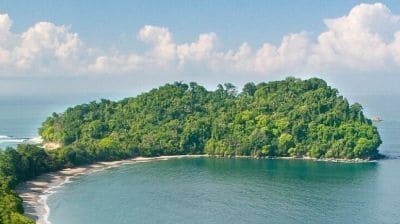Home › Diving Destinations › Central America and Caribbean › Costa Rica
Scuba Diving around Costa Rica Islands
No matter whether you go diving at the Pacific side or the Caribbean Sea coastline, all of the Costa Rica dive sites deliver an exhilarating experience.
This section contains practical information for divers heading out to the islands near Costa Rica, with extra details about the native marine life in Central America.
What Months are Best for Costa Rica Diving
Two distinctly different coastlines offer two diversified destinations for scuba divers.
Most of the spectacular Costa Rica dive sites are located in the Pacific Ocean (on the west side).
Yet, head over to the eastern shorelines and the Caribbean side offers a rich biodiversity - albeit with some challenging diving conditions and warmer seas.
So, if you want to dive in the dry season, the best time to go diving in Central America and the Caribbean is from December through to May.
The cooler months bring calmer seas and clearer visibility. Whereas, choose to dive in the rainy season (from June until November), and the appearance of plankton rich water creates the trigger for the arrival of big pelagic fishes (e.g. hammerheads and whale sharks).
Generally, the water temperature on the eastern Pacific coast ranges between 24 and 29° Celsius (84° Fahrenheit).
However, the water on the Caribbean Sea is more stable and tends to be slightly warmer, ranging between 27 and 29° Celsius (80–84° Fahrenheit).
Sea Life at Costa Rica Dive Sites
The conditions for scuba diving vary, especially the water movement, underwater visibility, and the sea life (e.g. animal migrations).
Nonetheless, scuba diving around Costa Rica is generally considered as being a year-long uninterrupted activity.
Apart from the usual hard and soft coral formations, and colourful reef fishes, some of the lesser spotted marine species that divers might also see, include:
- Bottlenose dolphins (genus Tursiops)
 Bull sharks (Carcharhinus leucas)
Bull sharks (Carcharhinus leucas)- Eagle ray (Myliobatidae)
- Hawksbill sea turtles (Eretmochelys imbricata)
- Humpback whales (Megaptera novaeangliae)
- Mahi Mahi (common dolphinfish)
- Manta rays (genus Mobula)
- Parrotfishes (e.g. green humphead parrotfish)
- Scalloped hammerhead shark (family Sphyrnidae)
- Seahorses (genus Hippocampus)
- Skate fish (Rajiformes)
- Whitetip reef sharks (Triaenodon obesus)
Pro Tip: We have a section dedicated to sea wildlife with detailed information about the characteristics, habitats, and behavioural traits of marine vertebrates and aquatic invertebrates.
Alajuela Province Dive Sites
Cocos Island Dive Sites
Golfito Bay Dive Sites
Guanacaste Province Dive Sites
Limón Province Dive Sites
Manuel Antonio National Park (Quepos) Dive Sites
Osa Peninsula Dive Sites
Playa Flamingo Dive Sites
Playa Hermosa Dive Sites
Puntarenas Province Dive Sites
Related Information and Help Guides
- Awesome Destinations for Scuba Diving around the World
- Everything Beginners Should Know about Snorkeling
- List of Scuba Certification Levels and Popular Dive Courses
- Types of Sea Life and Species Information with Pictures
- Where are the Premier Dive Sites in Asia for New Divers?
Getting to Costa Rica
It's fair to say that flying into Costa Rica is straightforward. So, you can choose between Juan Santamaría International Airport in Alajuela and Daniel Oduber International Airport in Guanacaste.
Even so, many tourists choose to enter the Central American country by bus from neighbouring countries, such as Nicaragua or Panama.
You can reach any of the two coastlines from San Jose by private transfer or bus. But, divers should expect to travel by liveaboard to most of the offshore island dive sites.
NovoScuba "Changing the Game in Dive Training"
The innovative AI-powered virtual instructor and learning assistant is designed to help students and dive professionals quickly access and understand key diving information.
We would like to thank NovoScuba ("Andy Cross") for kindly providing us with information about the best Costa Rica diving spots and local knowledge about the resident marine life.